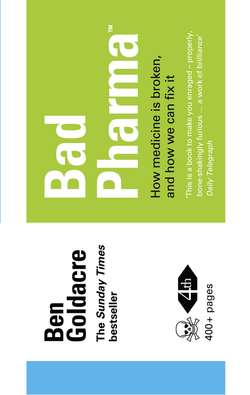Читать книгу Bad Pharma: How Medicine is Broken, And How We Can Fix It - Ben Goldacre - Страница 8
How to read this book
ОглавлениеI have set out to explain the flaws in our systems for assessing the benefits of treatments, and for disseminating the evidence we collect. Often, one specific drug is used as an example to explain a wider systemic flaw; but this is not an almanac of good and bad drugs, and you certainly shouldn’t change your medication based on what you read here. If you are concerned by what you read, there is advice on what you can do to improve things for yourself, and for others, at the end of the book. Most of the harms discussed arise from our failure to do the best we can, not from handing out treatments that are worse than nothing. If that disappoints you, if you want more melodrama, then I suggest you go and read a book by a quack.
I deliberately haven’t gone overboard to explain every medical term, to save space and avoid distractions: this doesn’t mean that you miss out. If a symptom, for example, isn’t explained or defined, that means you genuinely don’t need this detail to understand the story; but I’ve left the long word in to help medics or academics find their feet, and to anchor the general principle in a specific corner of medicine for them. Acronyms and abbreviations are defined as we go, and used in a haphazard way after that, because this is how people talk in the real world. There’s a glossary at the back for some common ideas, really just in case you read sections out of order, but there’s nothing in there that doesn’t come up in the main text.
Similarly, I haven’t given the full names of most clinical trials, because they are conventionally known by their acronyms, and most medical textbooks wouldn’t bother either: the ‘ISIS trial’, the ‘CAST trial’, in the minds of most doctors and academics, are the real names. If you’re very interested, you can search for them online or in the endnotes, but they’re not relevant to your enjoyment or understanding of the arguments in this book. Drugs present a different problem, because they have two names: the generic name, which is the correct scientific name for the molecule; and then the brand name used by the company manufacturing it in their packaging and advertising, which is usually a bit catchier. In general, doctors and academics think you should always use the scientific name, because it tells you a little about the class of the molecule, and is less ambiguous; while journalists and patients will more often use brand names. But everybody is inconsistent about which name they use, and in this book, so am I. Again, this simply reflects how people talk about medicines in the real world.
All the specific studies discussed are referenced at the back of the book. Where there was a choice, I’ve tried to select papers in open-access journals, so that they can be read for free by all. I’ve also tried to reference papers that give a good overview of a field, or good books on a subject, so that you can read more on whole areas if you want to.
Lastly: to an extent, this is a field where you need to know everything, to understand how it impacts on everything else. I’ve bent over backwards to introduce the ideas in the best order, but if all this material is completely new to you, then you might spot some extra connections – or feel greater outrage in your belly – reading it a second time. I have not assumed any prior knowledge. I have, however, assumed that you might be willing to deploy a little intellectual horsepower here and there. Some of this stuff is hard. That’s precisely why these problems have been ignored, and that’s why I’ve had to explain it to you here, in this book. If you want to catch people with their trousers down, you have to go into their home.
Enjoy.
Ben Goldacre August 2012
For this 2013 edition of the book, I’ve made occasional small changes to the text, many of them in light of helpful comments from readers: this was to disambiguate, improve, toughen and occasionally correct small errors (such as n/3 instead of 3/n here, which broke my heart). Over the past year, even more evidence has been published about the ongoing problems described in this book. I’ve resisted the urge to expand every section, but some of this new evidence is covered in the new Afterword, ‘What Happened Next’. For the key problem of withheld trial data, there has been an international campaign over the course of 2013, with some small forward movement; this is also described at the end, and I hope it will rouse you to action.
Ben Goldacre August 2013
